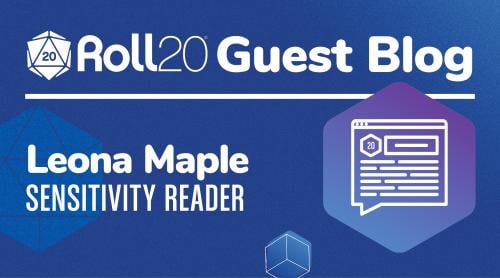
The Roll20 Team
NOTE: In the following blog, I focus on and use the intersection of race and racism for my examples because it is the topic I am most comfortable speaking to - any other form of -ism/-ist (such as ableism and ableist) also applies.
The TTRPG world is unbelievably creative - we’ve seen so many cool games come to fruition, as well as settings, supplements, and so much more. As a community, we’re building worlds that are as diverse as we are.
But what if, while homebrewing something for your D&D game, or even creating a whole new game, you’re inspired by a culture and want to pull elements from that culture into your setting?
You’ve probably heard or seen that not all TTRPGs are very inclusive to all, and some can actually be pretty hurtful. In my work as a sensitivity reader I’ve seen a number of things that had the potential to cause harm, such as insensitive plotlines, or poorly researched use of cultural items. You know you don’t want to be _that _person, but you’re not familiar enough with a specific culture to know if what you’ve created is respectful or harmful. A sensitivity reader is your best ally in these situations.
You may or may not have heard of sensitivity readers before - and that’s okay! Hi, I’m Leona, and I’m a sensitivity reader. I’ve had the honor of working on projects large and small, from homebrew worlds for home games to thrilling brand new titles like Burn Bryte!
A sensitivity reader is someone who can help check over your content and ensure it’s not racist, ableist, sexist, and so on, depending on what your sensitivity reader is checking for. Readers can help guide you towards taking a more thoughtful approach to anything that sticks out to us as problematic.
I want to be clear, however: Sensitivity reading is NOT here to make everything feel soft and safe - we recognize that sometimes games need to cover hard topics. A sensitivity reader will help ensure that those hard topics are navigated in ways that are less likely to accidentally cause harm to a marginalized person at the table. Sensitivity readers are also NOT a guarantee that your work is completely free of problems - we merely provide one perspective, and others may read your work differently from your sensitivity reader. Just because you hired a sensitivity reader does not mean your work is above reproach - and further, you are still responsible for what you’re creating.
Some questions I get often are: When should I bring in a sensitivity reader? How do I know if I need one? Who do I pick? And how? If you feel you need a sensitivity reader, hire them - it never hurts to have someone double check your work! Bring a sensitivity reader in as early as you want, or as late as you want - starting the project with your sensitivity reader means they can help shape the work and save you from having to go back and rework things, but if you’re at the end of your project, it’s not too late to have a sensitivity reader look at it.
Sensitivity readers can take a close look at the final material and suggest changes, edits, and things you might want to add or remove. Both ways of working with a sensitivity reader have their merits.
Picking a sensitivity reader means approaching some folks that are experts in the particular intersections that you’re concerned about in your creation. So, if you’re worried about racism particularly against black folx in your work, hire a black sensitivity reader. If you’re worried about casual ableism, hire a disabled sensitivity reader. If your content covers a variety of intersections, you may need to bring on more than one reader, but your current reader can advise you if it’s needed or not.
So, okay - this makes sense for folks that are publishing games, but does it really matter when it’s just me and my friends running our homebrew D&D game? It just might. Do you truly want your game to have racism/ableism/-ism in it? While it’s not strictly necessary, I have absolutely been approached by people working on their home games to make sure they’re not contributing to harmful tropes while they play. No project is too small or too big for a sensitivity reader.
Sensitivity readers are here to support you because we recognize that not everyone can account for every perspective. Together, we can build worlds that are diverse, inclusive, and fun to play in!
_ Leona Maple is a sensitivity reader and the founder of Maple Intersectionality Consulting. She works in the TTRPG industry and beyond to make the world a more inclusive place. You can find her on Twitter @TheLeonaMaple and reach her at TheLeonaMaple@gmail.com._
Help us support Code2040! As a tech company, we are striving towards a more equitable industry and one of the ways we’re doing that is with matching donations to Code2040, “a nonprofit activating, connecting and mobilizing the largest racial equity community in tech to dismantle the structural barriers that prevent the full participation and leadership of Black and Latinx technologists in the innovation economy.”__ Learn more and donate through our Tiltify campaign here: http://roll20.io/Tiltify-Code2040.__

